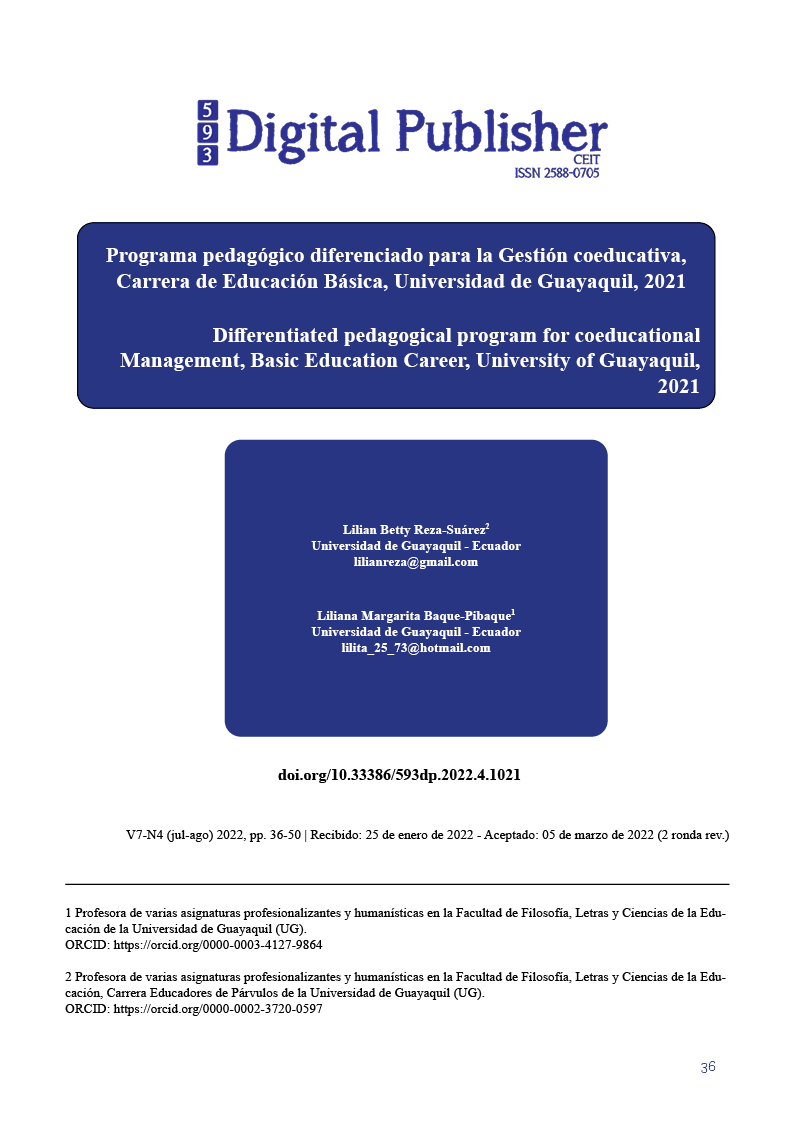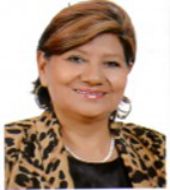Differentiated pedagogical program for coeducational Management, Basic Education Career, University of Guayaquil, 2021
Main Article Content
Abstract
This research seeks to know how men and women learn, since coeducation is enshrined in the Constitution of the Republic of Ecuador, to educate teachers in order to serve their students, considering structural differences, enhancing academic performance, in specific areas of knowledge such as language and mathematics, reflecting on the cognitive differences given by sex at the time of learning. The general objective is: to propose the application of a differentiated pedagogical program to strengthen the coeducational management of the teacher of the studied career. The applied-type study, descriptive scope, quantitative approach, non-experimental cross-sectional design, the sample contains 30 people with non-probabilistic convenience sampling, as a data collection technique a survey was applied and the instrument a questionnaire with 20 closed questions On the Likert scale, the internal consistency of the instrument by Cronbach's alpha is 0.950, the analysis of the study variable showed in its results that the levels are at, low 20%, medium 57% and high 23%, with these measures It follows that coeducational management must be strengthened. Finally, it is found that coeducational management is directed to a mixed learning environment and requires conduction of teaching based on the form of neural learning from the biological aspect of men and women, by strengthening this characteristic, social equity is achieved.
Downloads
Article Details

This work is licensed under a Creative Commons Attribution-NonCommercial-ShareAlike 4.0 International License.
1. Derechos de autor
Las obras que se publican en 593 Digital Publisher CEIT están sujetas a los siguientes términos:
1.1. 593 Digital Publisher CEIT, conserva los derechos patrimoniales (copyright) de las obras publicadas, favorece y permite la reutilización de las mismas bajo la licencia Licencia Creative Commons 4.0 de Reconocimiento-NoComercial-CompartirIgual 4.0, por lo cual se pueden copiar, usar, difundir, transmitir y exponer públicamente, siempre que:
1.1.a. Se cite la autoría y fuente original de su publicación (revista, editorial, URL).
1.1.b. No se usen para fines comerciales u onerosos.
1.1.c. Se mencione la existencia y especificaciones de esta licencia de uso.
References
Agra, G., Formiga, N. S., Oliveira, P. S. de, Costa, M. M. L., Fernandes, M. das G. M., & Nóbrega, M. M. L. da. (2019). Analysis of the concept of Meaningful Learning in light of the Ausubel’s Theory. Revista Brasileira de Enfermagem, 72(1), 248–255. https://doi.org/10.1590/0034-7167-2017-0691
Ahmad, S., Wasim, S., Irfan, S., Gogoi, S., Srivastava, A., & Farheen, Z. (2019). Qualitative v/s. Quantitative Research- A Summarized Review. Journal of Evidence Based Medicine and Healthcare, 6(43), 2828–2832. https://doi.org/10.18410/jebmh/2019/587
Alvarez, P. (2018). Ética e investigación. Revista Boletín Redipe, 122–149. https://revista.redipe.org/index.php/1/article/view/434
Arias-Valencia, S., & Peñaranda, F. (2015). La investigación éticamente reflexionada. Revista Facultad Nacional de Salud Pública, 33(3), 444–451. https://doi.org/10.17533/udea.rfnsp.v33n3a15
Arias, E., Hincapié, D., & Paredes, D. (2020). Educar para la vida: El desarrollo de las habilidades socioemocionales y el rol de los docentes. Banco Interamericano de Desarrollo. https://publications.iadb.org/publications/spanish/document/Educar-para-la-vida-El-desarrollo-de-las-habilidades-socioemocionales-y-el-rol-de-los-docentes.pdf
Aristizabal, P., Gomez-Pintado, A., Ugalde, A. I., & Lasarte, G. (2018). La mirada coeducativa en la formación del profesorado. Revista Complutense de Educación, 29(1), 79–95. https://doi.org/10.5209/RCED.52031
Arnastauskaitė, J., Ruzgas, T., & Bražėnas, M. (2021). An Exhaustive Power Comparison of Normality Tests. Mathematics, 9(7), 788. https://doi.org/10.3390/math9070788
Belmonte Serrano, M. Á. (2010). Requisitos éticos en los proyectos de investigación. Otra oveja negra. Seminarios de la Fundación Española de Reumatología, 11(1), 7–13. https://doi.org/10.1016/j.semreu.2009.09.005
Blas, G., & Leiva, Lady. (2019). LAS HABILIDADES SOCIOEMOCIONALES Y EL RENDIMIENTO ESCOLAR EN NIÑOS DE 4 Y 5 AÑOS DE LA I.E.P. FRAY MARTÍN DE PORRES – TRUJILLO 2018 [UNIVERSIDAD PRIVADA ANTENOR ORREGO]. https://repositorio.upao.edu.pe/bitstream/20.500.12759/4996/1/RE_EDU_GRECIA.BLAS_LADY.LEIVA_HABILIDADES.SOCIOEMOCIONALES_DATOS.pdf
Broch, D., & Sanahuja Ribés, A. (2019). Trabajando la coeducación a través del cuento de ‘La Cenicienta’ desde un proceso de investigación-acción. Tendencias Pedagógicas, 34, 169. https://doi.org/10.15366/tp2019.34.013
Calvo, M. (2012). La educación diferenciada. Un modelo de educación personalizada y una opción de libertad. https://gloria.tv/post/aEtGhfYrtkAF2dJ3v2bPzqAGd
Carrascal, S. (2021). Visibilidad femenina en educación como motor de cambio y de igualdad. Revista Estilos de Aprendizaje (Journal of Learning Styles), 13, 1. http://revistaestilosdeaprendizaje.com/announcement/view/26
Celador, O. (2020). SINGLE SEX PUBLIC EDUCATION IN THE LATEST DECISIONS OF THE CONSTITUTIONAL COURT. DERECHOS Y LIBERTADES, 40, 27–60. https://doi.org/10.14679/1152
CONCYTEC. (2018). Memoria Institucional 2018. Memoria Institucional 2018. http://portal.concytec.gob.pe/index.php/publicaciones/memoria-institucional/item/233-memoria-institucional-2018
Condori, L. (2018). Coeducación en la realidad educativa y los factores asociados a la especialización de Artes Plásticas de los estudiantes de las Escuelas Superiores de Formación Artística Pública de la región Puno, 2016 [UNIVERSIDAD NACIONAL DE EDUCACIÓN]. https://repositorio.une.edu.pe/bitstream/handle/UNE/1852/TD CE 1839 C1 - Condori Chuchi.pdf?sequence=1&isAllowed=y
De_Rosa, P. (2018). Enfoque psicoeducativo de Vigotsky y su relación con el interaccionismo simbólico: Aplicación a los procesos educativos y de responsabilidad penal juvenil. Propósitos y Representaciones, 6(2), 631. https://doi.org/10.20511/pyr2018.v6n2.246
FOMINAYA, C., & SETIÉN, M. (2018). «En Inglaterra los colegios con mejores notas son los que practican una educación diferenciada». ABC Educacion. https://www.abc.es/familia/educacion/abci-inglaterra-colegios-mejores-notas-practican-educacion-diferenciada-201603221638_noticia.html?ref=https://www.google.com/
Frey, B. B. (2018). The SAGE Encyclopedia of Educational Research, Measurement, and Evaluation. En The SAGE Encyclopedia of Educational Research, Measurement, and Evaluation. SAGE Publications, Inc. https://doi.org/10.4135/9781506326139
García, E. (2003). Neuropsicología y género. Revista de la Asociación Española de Neuropsiquiatría, 7–18. https://scielo.isciii.es/scielo.php?script=sci_arttext&pid=S0211-57352003000200002
Grenier, N., & Moldoveanu, M. (2011). DIFFERENTIATED PEDAGOGY: A NEW TEACHING MODEL IN MULTIETHNIC ELEMENTARY SCHOOL SETTINGS IN QUEBEC, CANADA. 3rd International Conference on Education and New Learning Technologies, 758–765. https://library.iated.org/view/GRENIER2011DIF
Guzmán, V., & Fierro, W. (2018). ACOMPAÑAMIENTO PEDAGÓGICO PARA MEJORAR EL RENDIMIENTO ESCOLAR EN NIÑOS DE COMUNIDADES RURALES. Revista de Investigación Enlace Universitario, 17(1), 19–24. https://doi.org/10.33789/enlace.17.36
Hasnine, M. N., Ahmed, M. M. H., & Ueda, H. (2021). Learner-Centric Technologies to Support Active Learning Activity Design in New Education Normal: Exploring the Disadvantageous Educational Contexts. International Journal of Emerging Technologies in Learning, 16(10), 150–162. https://doi.org/10.3991/IJET.V16I10.20081
Hurtado, J. (2000). Metodología de la investigación holística (F. Sypal (ed.); tercera). https://ayudacontextos.files.wordpress.com/2018/04/jacqueline-hurtado-de-barrera-metodologia-de-investigacion-holistica.pdf
Kwak, S. G., & Park, S.-H. (2019). Normality Test in Clinical Research. Journal of Rheumatic Diseases, 26(1), 5. https://doi.org/10.4078/jrd.2019.26.1.5
Liu, C., Solis, L., Jensen, H., Hopkins, E., Neale, D., Zosh, J., Hirsh-Pasek, K., & Whitebread, D. (2017). Neuroscience and learning through play: a review of the evidence (T. LEGO & Foundation (eds.)). https://www.legofoundation.com/media/1064/neuroscience-review_web.pdf
Loaiza, E. M. de L., Salazar Torres, P. M., & Romero Izurieta, R. (2020). El alumnado de la Universidad de Guayaquil: Un vistazo al equilibrio entre los sexos. RECIAMUC, 4(1), 229–241. https://doi.org/10.26820/reciamuc/4.(1).enero.2020.229-241
Loeb, S., Dynarski, S., Mcfarland, D., Morris, P., Reardon, S., & Reber, S. (2017). Descriptive analysis in education: A guide for researchers. http://ies.ed.gov/ncee/.
Marotti, A., & Wood Jr, T. (2019). What is applied research anyway? Revista de Gestão, 26(4), 338–339. https://doi.org/10.1108/REGE-10-2019-128
Martinez, E. R. (2020). Planificación curricular y evaluación formativa aplicada por los docentes De Las II.EE. Unidocentes De La Ugel 13 Yauyos 2020 [Universidad César Vallejo]. En Repositorio Institucional - UCV. https://repositorio.ucv.edu.pe/handle/20.500.12692/53763
OECD. (2012). Informe PISA 2009: Tendencias de aprendizaje. En Informe PISA 2009: Tendencias de aprendizaje. OECD. https://doi.org/10.1787/9789264177543-es
Pérez, J., & Ahedo, J. (2020). La educación personalizada según García Hoz. Revista Complutense de Educación, 31(2), 153–161. https://doi.org/10.5209/rced.61992
Prats, J., Salazar-Jiménez, R. A., & Molina-Neira, J. (2016). Implicaciones metodológicas del respeto al principio de autonomía en la investigación social *. Andamios, 13, 129–154. https://www.redalyc.org/journal/628/62846700007/html/
Reza, L. (2016). La influencia de las emociones en las expresiones faciales según Paul. Revista: CCCSS Contribuciones a las Ciencias Sociales, 1. https://www.eumed.net/rev/cccss/2016/02/emociones.html
Rodríguez, J. (2021). Educación mixta o educación diferenciada. Revista Universitaria de Informática RUNIN, 8(11), 1–8. https://doi.org/https://doi.org/10.22267/runin
Rotondo, M. (2018). Principios morales y metodología de la bioética. Revista Uruguaya de Cardiología, 33(1), 1–5. https://doi.org/10.29277/cardio.33.1.2
Roy, N., Torre, M. V., Gadiraju, U., Maxwell, D., & Hauff, C. (2021). Note the Highlight. Proceedings of the 2021 Conference on Human Information Interaction and Retrieval, 229–238. https://doi.org/10.1145/3406522.3446025
Salma, N., & Prastikawati, E. F. (2021). PERFORMANCE-BASED ASSESSMENT IN THE ENGLISH LEARNING PROCESS: WASHBACK AND BARRIERS. Getsempena English Education Journal, 8(1), 164–176. https://doi.org/10.46244/geej.v8i1.1305
Sanchez, C. A., Gama Vilchis, J. L., Ortíz Valdéz, I. I., & Sánchez Calderón, A. G. (2021). Habilidades Socioemocionales en estudiantes que cursan una carrera universitaria en modalidad mixta. Revista RedCA, 3(9), 119. https://doi.org/10.36677/redca.v3i9.15817
Serrano, R. B. (2015). EDUCACIÓN DIFERENCIADA Y CONCIERTOS PÚBLICOS TESIS DOCTORAL [Universidad de Sevilla]. https://idus.us.es/bitstream/handle/11441/32427/Rafael Báez Serrano - Educación diferenciada y conciertos públicos - Tesis Doctoral.pdf?sequence=1&isAllowed=y
Smale-Jacobse, A. E., Meijer, A., Helms-Lorenz, M., & Maulana, R. (2019). Differentiated Instruction in Secondary Education: A Systematic Review of Research Evidence. Frontiers in Psychology, 10, 2366. https://doi.org/10.3389/fpsyg.2019.02366
Suberviola, I. (2020). Aspectos básicos sobre el concepto y puesta en práctica de la coeducación emocional. Foro de Educación, 18(1), 189–207. https://doi.org/10.14516/fde.682
Trejo, M. L., Coutiño, G. L., & Pérez, H. C. P. y. (2015). EL ENFOQUE DE GÉNERO EN LA EDUCACIÓN. Atenas, 4(32), 49–61. https://www.redalyc.org/articulo.oa?id=478047208004
Troya, M. (2019). Universidad Andina Simón Bolívar [Universidad Andina Simón Bolivar sede Ecuador]. https://repositorio.uasb.edu.ec/bitstream/10644/6897/1/T2971-MIE-Troya-Coeducacion.pdf
UNESCO. (2019). Gender Equity, Equality and Learning Assessments NEQMAP Thematic Review. En France & and U. B. Office (Eds.), United Nations Educational, Scientific and Cultural Organization. https://neqmap.bangkok.unesco.org/wp-content/uploads/2020/04/Thematic-review-gender-equity-equality-and-LA.pdf
Walhovd, K. B., Tamnes, C. K., & Fjell, A. M. (2014). Brain structural maturation and the foundations of cognitive behavioral development. Current Opinion in Neurology, 27(2), 176–184. https://doi.org/10.1097/WCO.0000000000000074
Wall, J., Aeddula, O. K., & Larsson, T. (2020). DATA ANALYSIS METHOD SUPPORTING CAUSE AND EFFECT STUDIES IN PRODUCT-SERVICE SYSTEM DEVELOPMENT. Proceedings of the Design Society: DESIGN Conference, 1, 461–470. https://doi.org/10.1017/dsd.2020.123
Xin, J., Zhang, Y., Tang, Y., & Yang, Y. (2019). Brain Differences Between Men and Women: Evidence From Deep Learning. Frontiers in Neuroscience, 13, 185. https://doi.org/10.3389/fnins.2019.00185
Yoon_Soo, P., Konge, L., & Artino, A. R. (2020). The Positivism Paradigm of Research. Academic Medicine, 95(5), 690–694. https://doi.org/10.1097/ACM.0000000000003093



